Covid-19: Northern Ireland's major milestones
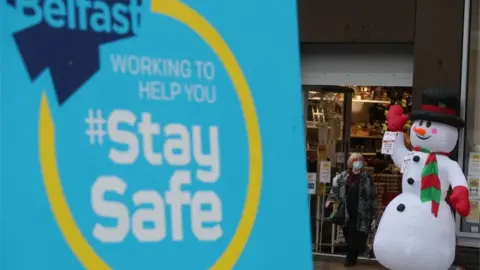 PA Media
PA MediaWhen a lockdown was announced in March, in a bid to limit the spread of coronavirus, most of us thought it would be a few weeks of hunkering down - sticking together but staying apart.
Christmas restrictions may not have been on our radars.
But somewhere along the way, the reality kicked in that Covid-19 was here for the long haul - but hopefully not forever, with the approval of two vaccines in the UK.
But how did we get here? We take a look at the major milestones in Northern Ireland's response to Covid-19.
The first case in Northern Ireland
She had been in northern Italy and flew in to Dublin Airport before travelling on to Northern Ireland.
By 19 March, the first coronavirus-related death in Northern Ireland was confirmed.
 TEK IMAGE/SCIENCE PHOTO LIBRARY
TEK IMAGE/SCIENCE PHOTO LIBRARYUp to 29 December, a total of 1,311 deaths had been recorded by the Department of Health (DoH). Its daily figures are based on a positive test result having been recorded.
By contrast, in the week ending 18 December, there were a total of 1,649 Covid-19-related deaths recorded by the Northern Ireland Statistics & Research Agency (Nisra).
Nisra's figures are based on mentions of the virus on death certificates, so people may or may not have previously tested positive for the virus.
On 30 December, the DoH reported a record number of positive coronavirus cases in 24 hours.
A dire warning
The day the first death was announced, Health Minister Robin Swann described the scale of the impending surge as being "of biblical proportions".
He said there could be 14,000 to 15,000 deaths, adding, "that is the nightmare, worst-case scenario".
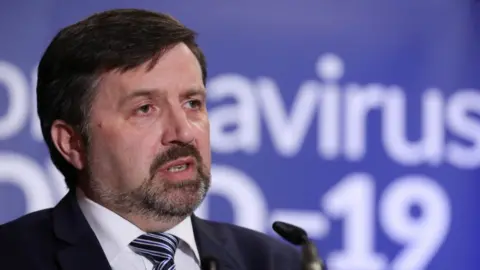 PAcemaker
PAcemakerThe executive's response and public health messaging did not go unchallenged on social media.
However, in September Mr Swann hit out at what he called the "usual suspects" on "socially-distanced high horses".
Closing the schools
This proved to be another hot potato politically.
Schools in the Republic of Ireland closed on 13 March, and subsequently the first sign of divisions appeared within the Northern Ireland Executive over its handling of the crisis.
Twelve hours after the executive issued an agreed response to keep schools open, Deputy First Minister Michelle O'Neill broke ranks and insisted that schools should close immediately.
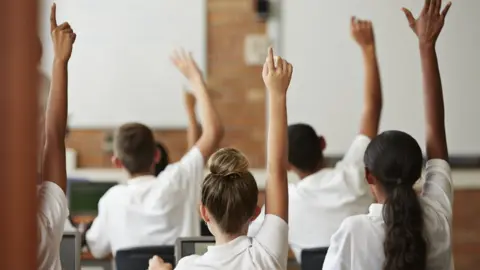 Getty Images
Getty ImagesSchools in Northern Ireland closed a few days later and remained shut for five months.
They were back for the new September term but closed for an extended half term break on 19 October as part of tighter Covid-19 restrictions imposed by the executive.
Plans to reopen schools in the first week of January 2021 were also changed in response to "unprecedented levels of positive Covid-19 tests since Christmas".
Locking down
On 28 March, the executive announced an unprecedented set of emergency regulations that brought Northern Ireland into line with the rest of the UK.
For the next few months people began a "new normal" - working from home if they could, no unnecessary journeys, no mixing with other households and many other restrictions on daily life.
Many businesses were forced to close and faced fines if they opened.
There was also a shortage of Personal Protective Equipment (PPE), such as gloves, face masks and aprons.
Health unions in particular voiced concerns about a lack of supplies and GPs warned the system was in crisis.
A joint order between the Republic of Ireland and Northern Ireland was not completed, despite Finance Minister Conor Murphy saying it had been agreed.
Eventually it seemed the PPE problem was resolved with the health minister saying there was a "sufficient" amount in April.
Almost 170m items of PPE were delivered in the first five months of the Covid-19 pandemic.
Track and trace
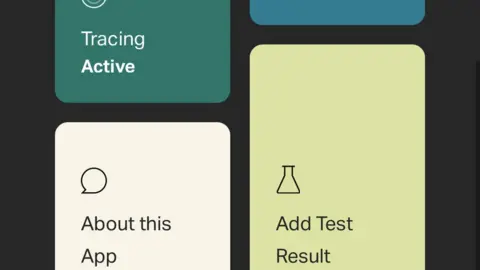 HSCNI
HSCNINorthern Ireland was the first of the four UK administrations to roll out a contact-tracing programme, as part of its plans to tackle coronavirus.
The system was initially carried out solely by telephone, with Public Health Agency staff talking to people who had tested positive, but from 9 October, the tracing service has been working on a "digital first" basis.
Northern Ireland launched its Stop Covid app at the end of July - the first part of the UK to have an app in place.
Help for businesses
The pandemic has had a devastating effect on some businesses.
Since lockdown was first announced in March, a range of financial measures has been introduced to help individuals and businesses but many firms felt they had fallen through the cracks.
 Pacemaker
PacemakerFrom the furlough scheme to grants, here is a full list of the support available.
The biggest failure?
Nursing homes emerged as one of the hidden stories of the Covid crisis.
At the end of May, Nisra revealed that nursing home residents had accounted for more than half of Covid-19-related deaths in Northern Ireland.
At the peak, 72 care homes experienced a Covid-19 outbreak.
Trouble on the hill
The public soon got used to Covid press briefings at Stormont with First and Deputy First Ministers Arlene Foster and Michelle O'Neill.
However, there was a hiatus in the double act when, at the end of June, Michelle O'Neill attended the funeral of leading republican Bobby Storey.
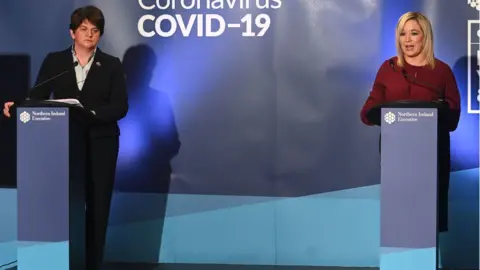 Pacemaker
PacemakerHowever, it was not just the two leaders who appeared at odds.
In November, Stormont talks were deadlocked over lifting Covid restrictions.
Face masks
During the first lockdown, mask wearing was not mandatory but as society began to emerge from lockdown there was a move towards encouraging the public to wear them.
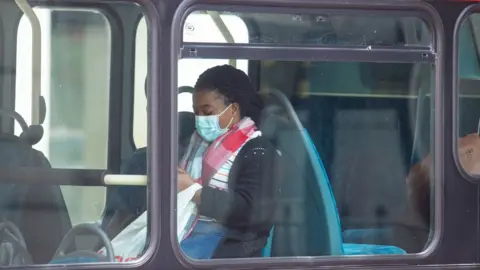 PA Media
PA MediaThe wearing of face coverings on most buses, trains and ferries then become mandatory in Northern Ireland from 10 July.
In August, the executive announced face masks would become compulsory in shops and other enclosed public spaces.
Ease, tighten and repeat
The last nine months has been marked by a gradual easing and then tightening of restrictions.
On 18 May, garden centres and recycling centres reopened, as part of a five-phase blueprint for lifting restrictions.
Non-essential retailers opened on 10 June, with much of the hospitality sector and beauty industry on 6 in July.
The Eat Out to Help Out scheme, which was put in place by Westminster, was a drive to boost the struggling hospitality industry.
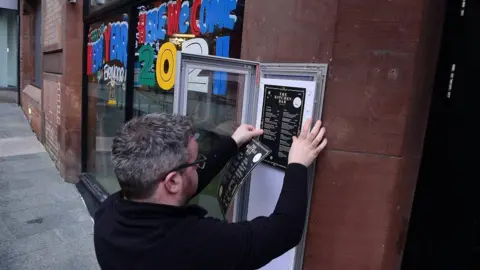 PAcemaker
PAcemakerHowever, as the R rate and hospital admissions began to rise, by autumn there were localised lockdowns and eventually more strict rules were put in place again.
Grades debacle
With exams cancelled due to the Covid-19 lockdown, A-level results were calculated using a mixture of teacher-predicted scores and a Department of Education algorithm.
Education Minister Peter Weir made a U-turn when more than a third of teacher-estimated grades were lowered in the final results issued on 13 August.
Four days later, he announced that students would be awarded the highest grade either predicted by their teacher or awarded using the algorithm.
The news the world waited for
On 2 December, it was announced that the UK had become the first country in the world to approve the Pfizer/BioNTech coronavirus vaccine.
Margaret Keenan, 90, became the first person in the world to be given the Pfizer Covid-19 jab.
The grandmother, originally from County Fermanagh, said it was the "best early birthday present".
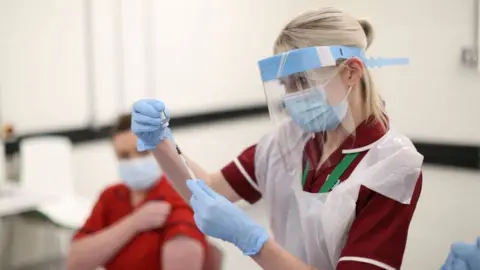 Reuters
ReutersThe first Covid-19 vaccine in Northern Ireland was then given to nurse Joanna Sloan on 8 December and is being rolled out throughout nursing homes.
'Tis the season to bubble?
On 22 November, a UK-wide plan was backed to allow some household mixing "for a small number of days" over Christmas.
The idea was that people from three households would be able to meet indoors over the Christmas period, from 23 to 27 December.
With that in mind people booked flights and made plans.
However, the news that a new coronavirus variant was spreading more rapidly changed everything.
On 19 December, UK Prime Minister Boris Johnson said the planned relaxation of Covid rules for Christmas had been scrapped for large parts of south-east England.
A travel ban meant a change of plan for those hoping to spend the festive season in NI.
The NI executive agreed to cut the "bubble" to just one day over Christmas.
But unlike the Republic of Ireland, the executive did not enforce a travel ban on those coming in from GB.
 Getty Images
Getty ImagesOn 26 December, Northern Ireland went into a six-week lockdown, with a plan to review it after four weeks.
The vaccination rollout continues - Covid-19 is not over yet, but the new year brings a new year of hope.
